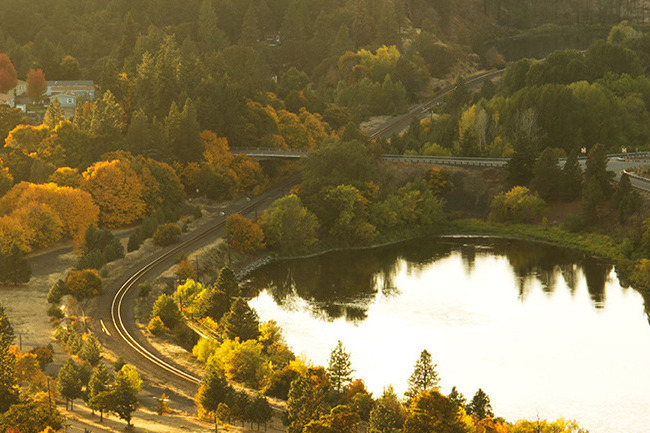503-490-3979 | michael@gorgefriends.org
Union Pacific has appealed Wasco County’s denial of its rail expansion proposal near Mosier, OR, in the Columbia River Gorge National Scenic Area. On Nov. 10, the Wasco County Board of Commissioners unanimously denied the proposed rail expansion based on adverse effects to the Yakama Nation’s tribal treaty rights and violations of the National Scenic Area land use ordinance. The appeal was filed before the Columbia River Gorge Commission, which has review authority over all final county decisions within the National Scenic Area.
Friends of the Columbia Gorge (Friends), Columbia Riverkeeper, and Physicians for Social Responsibility support the denial of the project based on treaty rights violations, but have also appealed the decision based on threats to fish and wildlife habitat, parks and recreation, scenic resources and Gorge communities like Mosier.
Friends’ staff attorney Steve McCoy explained, “Friends and our allies support the denial of the project to protect the Yakama Nation’s tribal treaty rights. The recent Mosier oil train derailment and explosion demonstrate the dangers to public safety and the National Scenic Area from Union Pacific’s plans to significantly increase rail traffic. This is why we’re asking the Columbia Gorge Commission to deny the project on multiple grounds and ensure Union Pacific doesn’t imperil public safety and trample over a national treasure.”
The City of Mosier is still recovering from the Union Pacific oil train derailment, spill and fire on June 3 that leaked 42,000 gallons of crude oil and contaminated groundwater in the small town. The derailment occurred within a quarter-mile of an elementary school. What saved Mosier from a large fire was that the day was uncharacteristically calm for the Gorge, with wind speeds below 5 mph. Union Pacific has estimated its costs for the derailment to be $8.9 million. The Federal Railroad Administration (FRA) released a report in June finding that Union Pacific was at fault for the accident because it failed to follow safety and rail inspection requirements. Nationally, Union Pacific has a poor safety record compared to the industry average.
“Last summer the image of an exploding oil train along the Columbia River burned into our collective memory. While Union Pacific was in a board room sketching out plans to increase profits, communities up and down the Columbia River were standing up to oil-by-rail and coal export,” stated Brett VandenHeuvel, Executive Director of Columbia Riverkeeper. “It was wise for Wasco County to deny Union Pacific’s plans for more unsafe oil trains.”
A rail traffic report released by Friends last August found that increases in rail capacity from this expansion could be far greater than Union Pacific has claimed, potentially increasing rail capacity from about 35 trains a day to as much as 100 trains a day. Link to report
“The increase in number and speed of trains would bring significant risks to the health and safety of residents of Mosier and other vulnerable populations along the UP track,” stated Dr. Nancy Crumpacker of Oregon Physicians for Social Responsibility. “These train engines emit exhaust that contains cancer-causing particles. The community of Mosier has suffered harm and should not assume more disruption as a result of illness, or worse, another fire and loss of lives.”
View Wasco County’s website for a copy of the decision
View copies of the notices of appeal: Friends, Columbia Riverkeeper, Physicians for Social Responsibility | Union Pacific
Read the FRA’s report on the Mosier derailment, as well as the agency’s safety analyses of UP and all railroads, respectively
###

